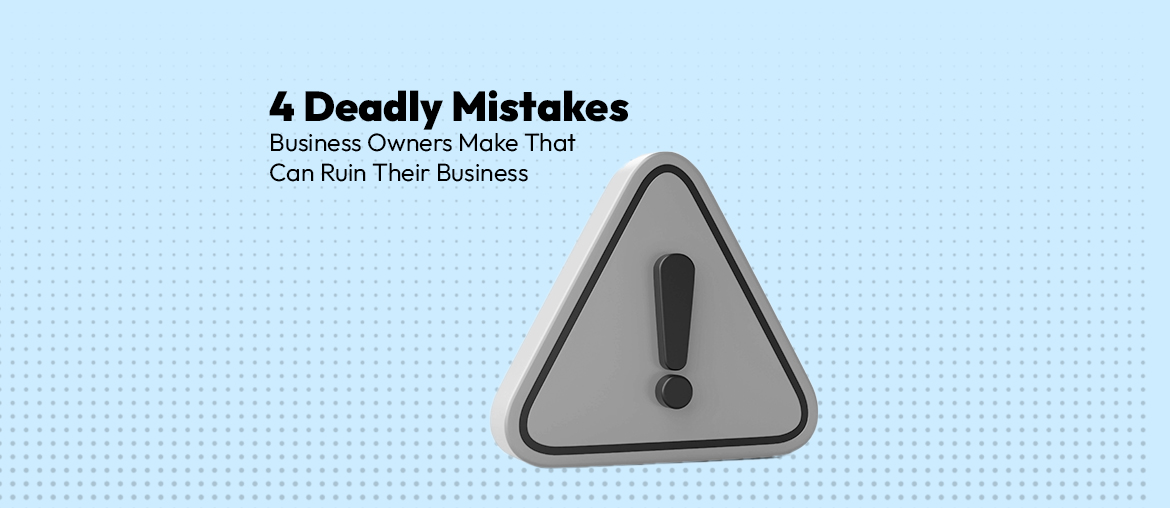Every business is susceptible to making mistakes from time to time. While some of these errors are unavoidable because they are part of the process of learning and growing the business and some businesses can recover quickly without any damages, some never do.
Several errors can contribute to a business fallout. Small businesses are particularly vulnerable to errors that can result in severe financial problems at best and bankruptcy at worst. Read to learn and avoid the most common mistakes that lead to business failure.
Customers are being ignored
Customers are the lifeblood of every business. There can be no success in business without a demand for a product or service and people who are willing to buy. Businesses that do not listen to their clients are more likely to lose out on repeat sales. Totally ignoring consumers especially their complaints, concerns, or questions, is a costly mistake that can easily lead to a business’s demise.
When a Customer purchases the products and/or services your offer and likes them, they are usually eager to come back again, leading to upward growth in your business. Customers will not only less likely to purchase from your business again if they strongly dislike anything about a product or service being sold and their reservations about it are completely ignored. They will also more likely spread negative information about the business and this can completely destroy a business
If the last thing you want as a business owner is to have an angry client air their grievances in front of other people who might become future clients. Get a business management tool like Esopos. With Esopos, you can have your customers’ information intact and this can help you in managing them. It also gives you access insight into how you can develop your products or services based on consumer reviews.
Customer service should always be the primary priority of the business and if a customer has nothing positive to say about your company, you should acknowledge their complaints or problems and thank them for their feedback. Often all it takes is gently listening to a disappointed customer to convince them to give you another chance to win their trust.
Not putting money back into the business
 Most business owners usually start off by pocketing any profit the business generates and considering any benefit as their income. You are starving your business’s growth if you don’t reinvest any of the revenue generated from your business.
Most business owners usually start off by pocketing any profit the business generates and considering any benefit as their income. You are starving your business’s growth if you don’t reinvest any of the revenue generated from your business.
One of your principal goals is likely to be to raise your income, but if you don’t reinvest a portion of your earnings, you’ll receive the same sum year after year or just make tiny, gradual increases.
You need money to expand your business, so you need to keep reinvesting during your growth process. For businesses to grow, they need working capital to do so; otherwise, they would not be able to expand.
Keeping Inaccurate Accounting Records Is A Major No-No.
No matter the size of your business, it’s the best idea to keep an accurate accounting record of the daily activities done in your business. When it comes to proper accounting, even the most mathematically gifted person will fail. Every business needs a much more meticulous business management tool. There are simply more costs and receipts to keep track of, as well as tax and discounts in places where applicable.
If you make the mistake of thinking, “Oh, I’ll start practicing traditional accounting principles later on, when I start doing a lot of business,” the chances are that your business will not be able to financially survive long enough to get to the point of doing a lot of business. A business will eventually suffer if it can’t keep reliable and trackable details of everything from everyday expenses and inventory to revenue records.
A business loses when the figures are incorrect. Small mistakes can be fixed. However, if errors persist over time, getting the business back on track can become nearly impossible. Inaccurate record-keeping, for example, can lead to expensive errors like over-ordering supplies, failing to deliver to customers on time, or having a bad cash flow as a result of not properly monitoring accounts receivables. In the end, failing to keep track of revenues and expenditures can spell disaster for almost any business
Not Measuring Your Business Health
As a business owner, consistent business reporting and tracking can be done weekly, monthly, quarterly, or annually to get a clear understanding of how the business is doing. “If you can’t weigh it, you can’t handle it,” as the old adage goes. Therefore, understanding the store’s financial situation and inventory management is critical to its survival.
 A detailed business report compiles all user data of the business that can be helpful to management in gaining insights into the business expenditure, growth, and profits, which can be used to help develop future forecasts, marketing strategies, and budgets.
A detailed business report compiles all user data of the business that can be helpful to management in gaining insights into the business expenditure, growth, and profits, which can be used to help develop future forecasts, marketing strategies, and budgets.
In monitoring your business activities, you should concentrate on the 20% of items that contribute to the other 80% of your revenue. Also, make sure the stock is well-managed. If your stock turn is too poor, it could indicate a lack of sales. If your stock turn is too high, it could indicate that you’re running out of goods that consumers want, or that you’re pricing needs to be reconsidered if you’re not making a profit.
Other relevant metrics to remember include your consumer conversion rate (the number of customers who walk through the door versus the number of sales) and the main metrics you should be tracking, such as prices, credit controls, stock turn, and stock keeping.
In Conclusion
One way to avoid all these mistakes is to use a business management tool like Esopos to manage all your business activities. Inventory management, profit, and Expense tracking, Stock monitoring, Customer and employee management can all be done with ease from detailed daily reporting. And the will help you keep up with the business activities and stay relevant

